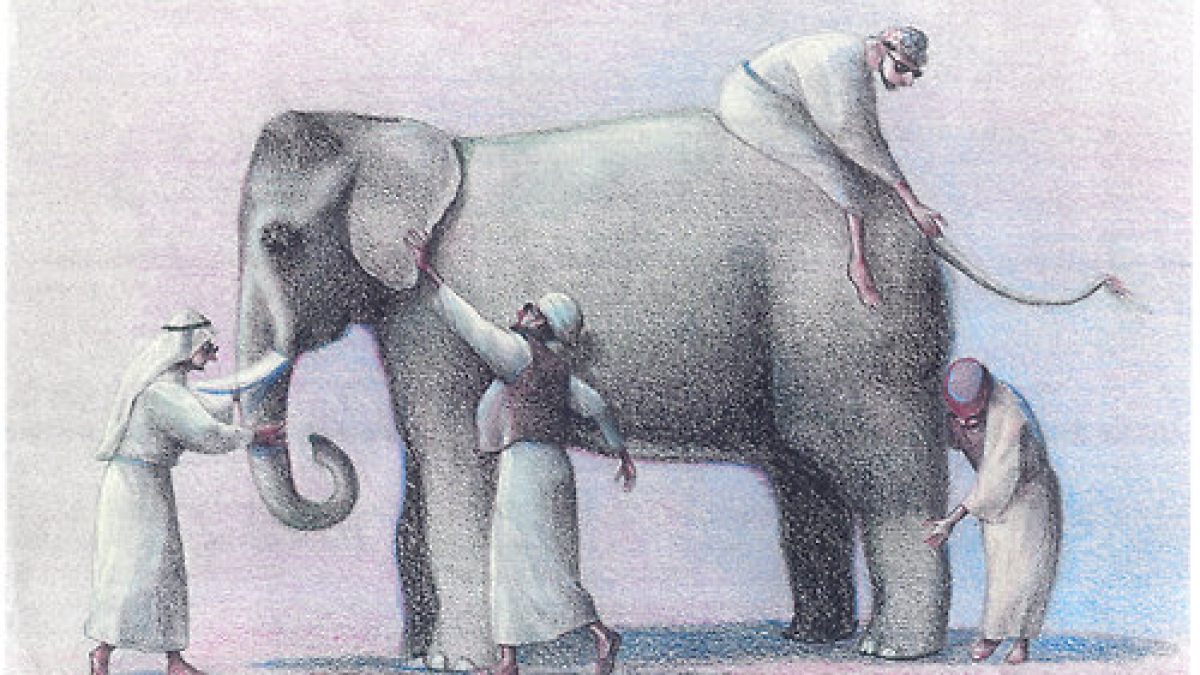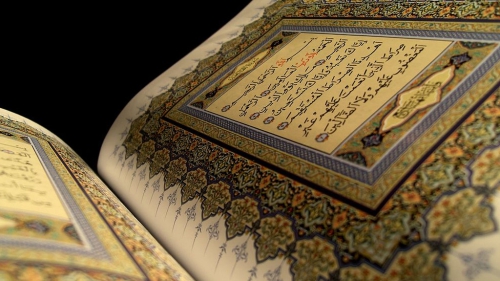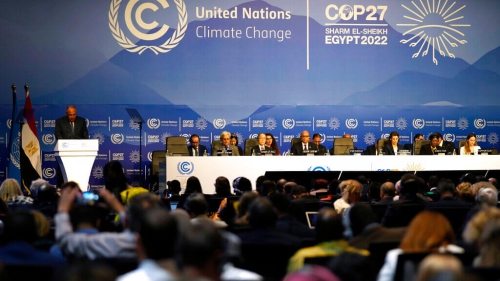Spiritual Illiteracy and Blindness

The universe is replete with the signs or ayat of the Creator which if properly studied lead people to duly understand, appreciate and worship Him. Such an undertaking, similarly, would lead to a proper comprehending, recognizing the actual value of, and an apt dealing with, nature. Being thus at ease with the world, a person will then become at ease with himself and his primordial nature (fitrah). He will confidently know who he is, why he was created and where he was heading. Only then will he become genuinely useful to himself and to others; only then will he turn himself into a productive civilizational force.
The Noble Qur'an harshly criticizes the notion of 'ghaflah' in connection with certain people's relationship with the signs that Allah has richly spread through each and every layer of creation. 'Ghaflah' literally means inattention, heedlessness and negligence, but in the context of reading and comprehending the signs of Allah, the term could be construed as 'spiritual illiteracy' or 'spiritual blindness'. Events and occurrences in nature to some people signify many things and pass on many messages. However, to other people whose senses have been impaired or blinded, the same occurrences appear as dead, dull and represent nothing.
This situation is akin to two travelers who have lost their sense of direction. One is literate, competent and eager to overcome his predicament, while the other is illiterate yet indifferent to what he was up against. However, they remain in the same condition until a sign is found. When a sign is discovered, to the delight of the first person, his major troubles appear to be over. The second person, in contrast, despite the existence of a clear sign is unable to benefit at all from it. The sign tells him nothing, regardless of how long he gazed at it. The most that he can gain from it is that it contains something that, nevertheless, is beyond both his grasp and interests. Moreover, due to his precarious condition, the same sign easily increases confusion and insecurity in the person, thus perpetuating his appalling psychological and spiritual state.
The Qur'an records that due to their arrogance and focus on some flawed pursuits, some people's senses become blinded, resulting in them being unable to see and read the signs of Allah which are literally scattered everywhere:
"And how many a sign within the heavens and earth do they pass over while they, there from, are turning away." (Qur'an 12: 105)
Indeed, it is tragic that such people remain short of perceiving the true meaning of life and death through the signals and messages of Allah's signs until they die. It is only when they die that the veil impeding their faculties is removed, and the pressure of the lures of their lusts is eliminated, thus making their sight sharp and the clarity of their vision great. Heretofore their senses have been blinded because they constantly turned away from and forgot Allah's Message and His incalculable signs, which have not been instituted save for the sake of humankind's total emancipation and deliverance. 'Abdullah Yusuf 'Ali writes about this in a beautiful fashion: "What is stupor or unconsciousness to this probationary life will be the opening of the eyes to the next world: for Death is the Gateway between the two. Once through that Gateway, man will realize how the things which he neglected or looked upon as remote are the intimate Realities, and the things which seemed to loom large in his eyes in this world were shadows that have fled. The things he wanted to avoid are the things that have really come to pass. Both Good and Evil will realize the Truth now in its intensity."
To wake up, in the most comprehensive sense of the word, not only to the real significance of life, but also to the corollaries of one's blindness and ignorance while in this world at the juncture of one's departing from it, is too little too late an accomplishment. Hence, the Noble Qur'an repeatedly communicates that such a belated realization is always accompanied by bitter remorse, disappointment, grief and endless self-reproach on the part of the unfortunate human being. However, once tasting death and passing through the gateway separating this probationary life from the hereafter takes place, there is no return. The time for repentance will then have passed. There is absolutely nothing that can be altered at this juncture, and the whole process reflects the permanent and divinely instituted laws of existence as the Qur'an states:
"But you will never find in the way (that is, established method) of Allah any change, and you will never find in the way of Allah any alteration." (Qur'an 35: 43)
Allah gives us an example of this:
"(For such is the state of the disbelievers) until, when death comes to one of them, he says: My Lord, send me back. That I might do righteousness in that which I left behind. No! It is only a word he is saying; and behind them is a barrier until the Day they are resurrected.} (Qur'an 23: 99-100)
Sure, the 'blind' persons' realization of their real state in the hereafter will be such an excruciating experience because they were deliberately blind to Allah's signs in this world, and hence, they will be resurrected blind as well, excluded from Allah's grace and His unbounded favours:
"And whoever turns away from My remembrance - indeed, he will have a difficult life, and We will raise him on the Day of Resurrection blind. He will say: My Lord, why have you raised me blind while I was [once] seeing?. [Allah] will say: Thus did Our signs come to you, and you disregarded them; and thus will you this Day be forgotten." (Qur'an 20: 124-126)
Due to this, in Islam, faith is normally associated with light, knowledge, wisdom, alertness and meditation, all of which are conditioned by the vigilance, cultivation and proper utilization of the human cognitive senses. Conversely, in Islam infidelity is normally associated with darkness, ignorance, negligence, blindness, thoughtlessness and apathy, all of which are conditioned by the impairment and mistreatment of the human cognitive senses. Accordingly, right knowledge leads to and buttresses faith; ignorance commands and cements faithlessness and vice. The Qur'an clearly indicates this scenario on many an occasion. A very interesting Qur'anic style is to frequently bring up the concept of heavenly signs, either in the Qur'an or the natural world, in the same contexts as the concepts of faith, spiritual well-being, knowledge, comprehension, making right judgments, contemplation, proper usage of cognitive senses, and so on.
It follows that those who are most Allah-conscious and fear Allah most of all amongst humankind are the learned ones:
"And among people, moving creatures and grazing livestock are various colours. Only those fear Allah, from among His servants, who have knowledge. Indeed, Allah is Exalted in Might and Forgiving." (Qur'an 35: 28)
They are those who dedicate their time and resources to reading about, discovering, recognizing and appreciating the signs of Allah in both the revealed Qur'an and the Book of Allah's creation. As an ultimate result of their knowledge and achievements, they set to intensify their profound worship of Allah and unselfish service to humankind. They do so because they recognize how meaningful, noble and advantageous the pursuits rooted in faith and wisdom are, as well as how hollow, ruinous and pathetic the pursuits rooted in ignorance and faithlessness are.
Knowledge, which is based on combining the two readings, the reading of revelation and the reading of nature, is the key to every good in both worlds. One's real achievements and happiness are commensurate with what and how much one reads, and with what and how much one knows. Both ignorance and 'erroneous readings' are the maladies that bring misfortune upon those who subscribe to both or either of them. It is difficult to ascertain which one of the two diseases is worse. As the Prophet (pbuh) used to implore his Lord to protect him from the evil of ignorance, he likewise often sought refuge with Allah from 'knowledge that brings no benefit'.
Based on the above, it is not difficult to understand why the whole earth has been made for the Muslims as pure and hence as a worthy place of worship (Sahih al-Bukhari); why the Muslims are strongly encouraged to traverse the earth and witness as many signs that operate within different contexts as possible (Qur'an [22: 46]; [29: 20]; [12: 109]); why no harm is to be inflicted on anybody and anything for whatever reason (Sunan Ibn Majah) and why all actions of Allah's faithful servants must be constructive and enlightening. Nor is it difficult to understand why the believers are fond of staying in touch with the natural environment as much as the prevailing conditions are able to permit. Total isolation from nature's kingdoms, no matter where and under what circumstances, is never a voluntary and enjoyable option for an enlightened servant of Allah. Total isolation from nature means a denial of access to a prime source of divine inspiration and light. Such should be seen as an offence with some potentially hazardous spiritual and mental corollaries. Interacting with nature is likely to inspire, stimulate, enlighten and soothe, whereas the opposite tends to stultify, depress and exasperate.
This is readily apparent in the ways the Islamic built environment has been perceived and created all the way through. For instance, the notion of the residential and institutional courtyard in the Islamic built environment surely became one of the most identifiable components throughout the history of Islamic civilization and in almost every geographical region. There were many factors that called for such an extensive usage of courtyards, however, intimately interacting with the fundamental elements of nature and the outside space, thus bringing nature to the core of an edifice and making it function as nature-friendly, was one of the most significant factors.
=====
This article is an excerpt from the author's book "The Philosophy of Decoration in Islamic Architecture"
*****
Dr. Spahic Omer, a Bosnian currently residing in Malaysia, is an Associate Professor at the Kulliyyah of Architecture and Environmental Design, International Islamic University Malaysia. He studied in Bosnia, Egypt and Malaysia. His research interests cover Islamic history, culture and civilization, as well as the history and philosophy of the Islamic built environment. He can be reached at spahicoyahoo.com; his blog is at www.medinanet.org .
Topics: Nature And Environment Values: Education, Knowledge, Spirituality
Views: 5253
Related Suggestions

















